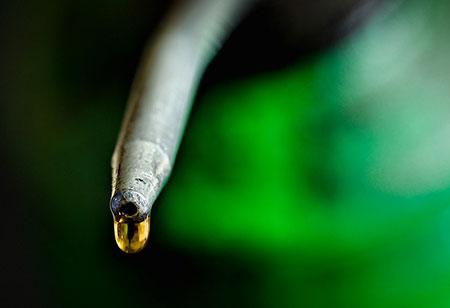THANK YOU FOR SUBSCRIBING

Eco-Friendly Lubrication Takes Hold in European Industry
Eric Baker, Director of Lubrication Technology, Donaldson

 Eric Baker, Director of Lubrication Technology, Donaldson
Eric Baker, Director of Lubrication Technology, DonaldsonEurope is promoting eco-friendly lubrication solutions, balancing sustainability with affordability through renewable, biodegradable lubricants, more innovative systems, and government incentives and tax breaks.
The industrial world operates on a delicate balance of lubrication. Traditional lubricants derived from petroleum pose significant environmental risks. However, Europe is leading a revolution with the rise of eco-friendly lubrication solutions.
The Need for Change: Environmental Concerns Drive Innovation
Conventional lubricants have considerable environmental drawbacks. Leaks and spills can contaminate soil and water, and disposing of used oil is a significant challenge. Furthermore, their production relies on fossil fuels, contributing to greenhouse gas emissions. Europe's strong focus on environmental regulations has spurred innovation in response to these concerns.
Biodegradable Champions: Vegetable Power Takes Over
A key player in this eco-revolution is the rise of biodegradable lubricants. These lubricants are formulated from renewable sources like vegetable oils (such as soybean and canola) or synthetic esters derived from biomass. Their primary advantage lies in their natural decomposition by microorganisms, which minimises environmental damage from accidental spills compared to petroleum-based lubricants.
Minimising Waste: Smarter Systems for a Sustainable Future
Europe is also pushing for lubrication systems that promote waste reduction. Condition monitoring is one approach where sensors track lubricant health and machinery performance, allowing for precise oil changes. This avoids unnecessary top-ups and minimises waste oil generation. Additionally, closed-loop lubrication systems are gaining traction. These innovative systems continuously filter and reuse lubricants, extending their lifespan and drastically reducing disposal needs.
Biodegradability Breakdown: A Nuanced Approach
Eco-friendly lubricants exhibit varying levels of biodegradability. Some achieve complete biodegradability, breaking down naturally, while others are readily biodegradable, decomposing quickly under specific conditions. Understanding these distinctions is crucial, as particular readily biodegradable lubricants may not be suitable for sensitive ecosystems like waterways.
Enhancing Bio-Based Performance
Advancements in material science are closing the performance gap between traditional and biodegradable lubricants. Ester-based lubricants, derived from plant oils, show exceptional promise. They offer excellent lubricity, a high viscosity index (maintaining consistency across temperatures), and good shear stability (resisting thinning under pressure). These properties make them ideal for demanding industrial applications such as wind turbines and heavy machinery.
The Rise of Green Chemistry: Embracing Non-Toxic Additives
A key component of eco-friendly lubricants is the use of non-toxic additives. These additives enhance performance and protect machinery without posing health risks or environmental harm. European research institutions are leading the development of next-generation, bio-based additives. This focus on "green chemistry" ensures that the entire lubrication lifecycle is environmentally responsible.
The Cost Equation: Balancing Sustainability with Affordability
While eco-friendly lubricants offer long-term environmental and operational benefits, their initial cost can sometimes be higher than traditional options. European governments and organisations are addressing this issue through incentives, tax breaks, and subsidies, making eco-friendly lubricants more accessible. As production scales up and technology matures, costs will decrease further.
The hallmark of a sustainable lubrication system is minimising waste. Europe is advancing towards a circular economy for lubricants, where used lubricants are collected, treated, and re-refined into usable base oils. This process not only reduces waste but also minimises dependence on virgin resources. Investment in advanced re-refining technologies is crucial for realising this vision.
The European Advantage: Regulations and Incentives Pave the Way
Europe's commitment to sustainability is crucial to this shift. Strict regulations, such as the European Union's End-of-Life Oil Directive, mandate the proper collection and treatment of used lubricants. Furthermore, several European countries offer incentives for using environmentally friendly lubricants, making them a more attractive option for industries.
Adopting eco-friendly lubrication solutions in European industries represents a significant shift toward sustainability. By embracing biodegradable lubricants, closed-loop systems, and innovative monitoring techniques, Europe minimises environmental impact and fosters a greener industrial landscape. As this technology continues to evolve and gain traction, its positive effects will be felt worldwide, paving the way for a future where industry and environment thrive harmoniously.
Read Also
















ON THE DECK